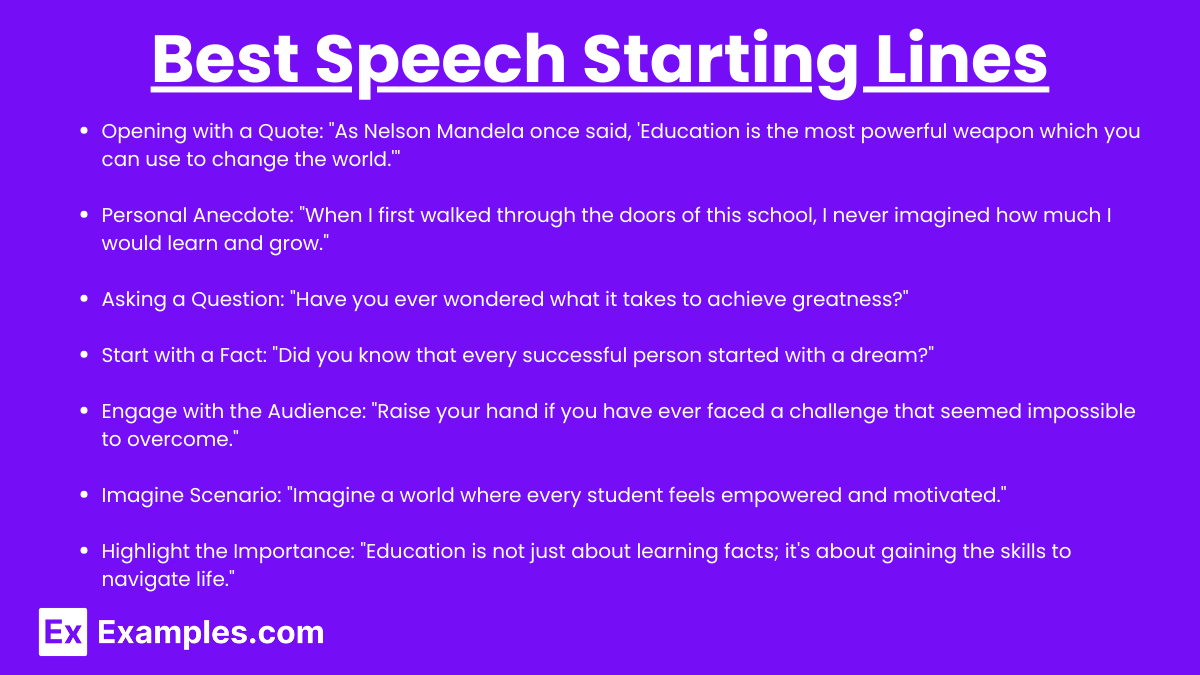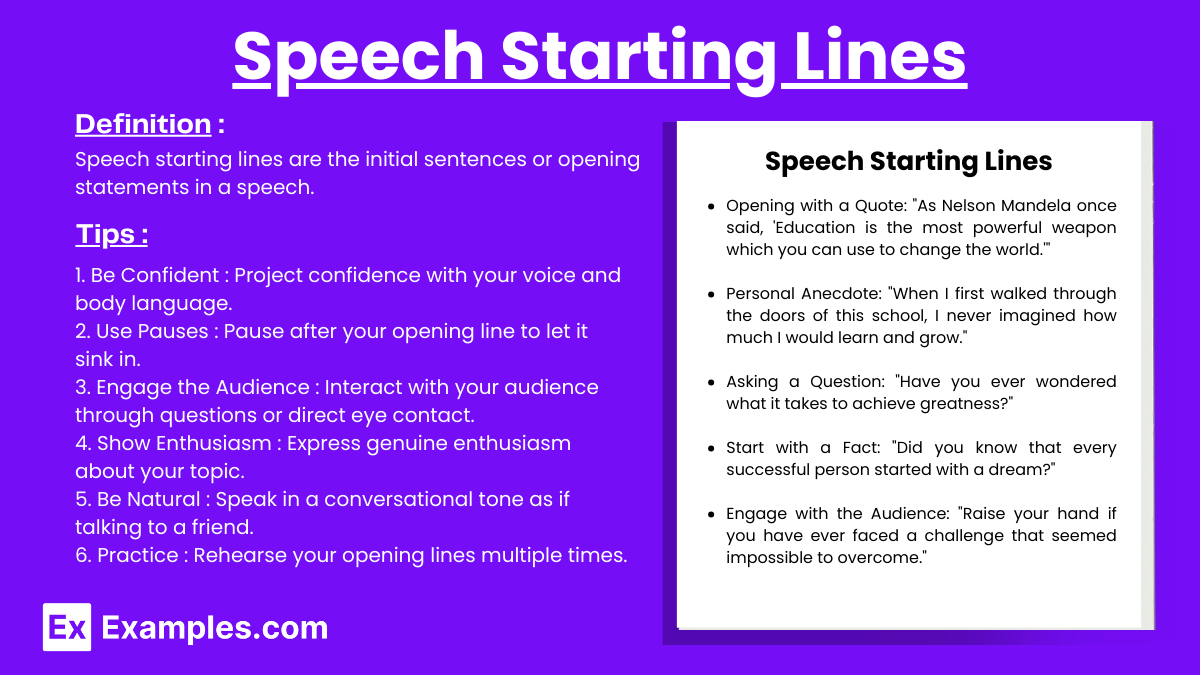32+ Speech Starting Line Examples
Speech starting lines are the initial sentences or opening statements in a speech. They serve to capture the audience’s attention, set the tone for the speech, and introduce the topic or purpose of the address. Effective speech starting lines are engaging, clear, and relevant to the audience, helping to establish a connection and interest right from the beginning.
What is Speech Starting Lines?
Speech starting lines are the initial phrases or sentences used to begin a speech. These opening remarks are crucial as they aim to grab the audience’s attention, introduce the subject matter, and set the stage for the rest of the presentation. Effective speech starting lines engage the audience, clearly present the topic, and establish the desired tone and context for the speech.
Speech Starting Lines Examples
Introduction and Greeting
“Good evening, everyone. Thank you all for being here tonight.”
Acknowledgment
“It’s an honor to stand before you on this special occasion.”
Introduction
“For those who might not know me, I’m John Smith, a member of this wonderful community for the past 10 years.”
Hook
“Let me start with a quick story. When I first joined this organization, I had no idea the profound impact it would have on my life.”
Preview
“Tonight, I want to share with you some of the lessons I’ve learned and the incredible experiences I’ve had along the way.”
30 Best Speech Starting Lines

- Opening with a Quote: “As Nelson Mandela once said, ‘Education is the most powerful weapon which you can use to change the world.'”
- Personal Anecdote: “When I first walked through the doors of this school, I never imagined how much I would learn and grow.”
- Asking a Question: “Have you ever wondered what it takes to achieve greatness?”
- Start with a Fact: “Did you know that every successful person started with a dream?”
- Engage with the Audience: “Raise your hand if you have ever faced a challenge that seemed impossible to overcome.”
- Imagine Scenario: “Imagine a world where every student feels empowered and motivated.”
- Highlight the Importance: “Education is not just about learning facts; it’s about gaining the skills to navigate life.”
- Personal Achievement: “One of my proudest moments as a student was when I…”
- Historical Reference: “In the words of Martin Luther King Jr., ‘The function of education is to teach one to think intensively and to think critically.'”
- Start with a Challenge: “We all face difficulties and obstacles, but it’s how we respond that defines us.”
- Use a Statistic: “According to recent studies, students who set clear goals are 50% more likely to achieve success.”
- Quote from a Famous Person: “Albert Einstein once said, ‘The only source of knowledge is experience.'”
- A Surprising Fact: “Did you know that more than 60% of the world’s population is under the age of 25?”
- An Interesting Anecdote: “I once heard a story about a student who turned a small idea into a global movement.”
- Open with a Joke: “They say school is like a lollipop. It seems fun at first, but then it gets sticky and complicated.”
- A Thought-Provoking Statement: “The future belongs to those who believe in the beauty of their dreams.”
- A Call to Action: “Today, I want to challenge you all to think bigger and dream bolder.”
- An Inspirational Quote: “Walt Disney once said, ‘All our dreams can come true, if we have the courage to pursue them.'”
- Start with a Mystery: “There’s something all great achievers have in common, and today, we’re going to discover what that is.”
- A Relatable Story: “We’ve all had those days when nothing seems to go right. But have you ever had one that turned into something amazing?”
- A Personal Experience: “When I first started this journey, I had no idea where it would lead me.”
- An Inspiring Statement: “Great things never come from comfort zones.”
- A Powerful Image: “Picture yourself standing at the top of a mountain, looking at the vast horizon ahead.”
- Use of Rhetorical Questions: “What if we could change the world? What if every small action we take makes a big difference?”
- A Touching Story: “I recently heard about a student who changed his community through a simple act of kindness.”
- A Surprising Statement: “You have the power to change the world, starting right here, right now.”
- A Provocative Question: “What would you do if you knew you couldn’t fail?”
- A Vision of the Future: “Imagine the impact we can make if we all work together towards a common goal.”
- An Emotional Hook: “There are moments in life that define who we are, and today, I want to talk about one such moment.”
- An Engaging Fact: “Studies show that students who are actively engaged in their learning are more likely to succeed.”
How to Write Speech Starting Lines
1. Use a Quote
Begin with a relevant quote.
Example: “Maya Angelou once said, ‘People will never forget how you made them feel.’ Let’s discuss the importance of empathy.”
2. Tell a Story
Start with a brief personal anecdote.
Example: “At ten, I got lost in a city. A stranger helped me, teaching me the value of kindness.”
3. Ask a Question
Pose a thought-provoking question.
Example: “Have you ever wondered what it takes to make a difference? Let’s explore impactful community service.”
4. Start with a Fact or Statistic
Open with an interesting fact.
Example: “Did you know nearly 70% of employees feel disengaged at work? Let’s discuss creating fulfilling workplaces.”
5. Make a Bold Statement
Grab attention with a strong statement.
Example: “Change is inevitable, but growth is optional. Let’s talk about choosing growth.”
6. Use Humor
Lighten the mood with humor.
Example: “Oscar Wilde said, ‘I have nothing to declare except my genius.’ Now, let’s discuss effective communication.”
7. Create a Vivid Image
Paint a picture with words.
Example: “Imagine standing on a cliff, the ocean before you. This leap of faith is what we’ll discuss today.”
Tips to Deliver Speech Starting Lines
1. Be Confident : Project confidence with your voice and body language.
2. Use Pauses : Pause after your opening line to let it sink in.
3. Engage the Audience : Interact with your audience through questions or direct eye contact.
4. Show Enthusiasm : Express genuine enthusiasm about your topic.
5. Be Natural : Speak in a conversational tone as if talking to a friend.
6. Practice : Rehearse your opening lines multiple times.
7. Breathe : Take a deep breath before you start to calm your nerves.
What is a good way to start a speech?
Start with a powerful quote, a surprising fact, or a personal anecdote to grab the audience’s attention and set the tone.
Why is the opening line of a speech important?
The opening line sets the tone, engages the audience, and establishes your credibility, making it crucial for a successful speech.
How can humor be used in a speech opening?
Use a relevant joke or a light-hearted comment to break the ice and create a relaxed atmosphere.
What role does a question play in starting a speech?
Starting with a question engages the audience and encourages them to think, making them more receptive to your message.
How does a personal story enhance a speech’s opening?
A personal story makes your speech relatable, builds a connection with the audience, and captures their interest.
Can starting with a quote be effective?
Yes, a well-chosen quote can provide insight, provoke thought, and set the stage for your topic.
How do you start a speech with a fact or statistic?
Present a surprising or relevant fact or statistic to grab attention and highlight the importance of your topic.
What is an engaging way to start a persuasive speech?
Start with a compelling fact, a provocative question, or a powerful statement to immediately engage and persuade your audience.
How can you use suspense in your speech opening?
Create suspense by hinting at a story or fact that you’ll reveal later, keeping the audience intrigued and attentive.
What is a strong way to start a motivational speech?
Begin with a personal success story or an inspiring quote to energize and motivate your audience.



